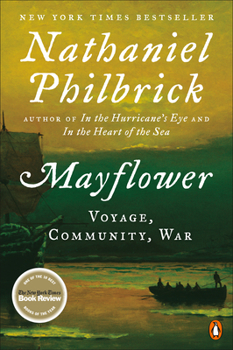Mayflower: Voyage, Community, War
Select Format
Select Condition 
Book Overview
"Vivid and remarkably fresh...Philbrick has recast the Pilgrims for the ages."--The New York Times Book Review Finalist for the Pulitzer Prize in History
New York Times Book Review Top Ten books of the Year With a new preface marking the 400th anniversary of the landing of the Mayflower. How did America begin? That simple question launches the acclaimed author of In...
Format:Paperback
Language:English
ISBN:0143111973
ISBN13:9780143111979
Release Date:April 2007
Publisher:Penguin Books
Length:496 Pages
Weight:0.91 lbs.
Dimensions:1.1" x 5.3" x 8.0"
Age Range:18 years and up
Grade Range:Grade 12 and higher
Related Subjects
Colonialism Native Americans Pilgrims Survival Warfare Americas Colonial Period History Military State & LocalCustomer Reviews
4 ratings
Book
Published by Lady of 10 , 1 year ago
Arrived on time as described
I purchased a good condition, hardcover.
Published by Christopher in Santa Fe, New Mexico , 2 years ago
A grubby, moth eaten softcover showed up...
An excellent read for this Thanksgiving.
Published by Thriftbooks.com User , 18 years ago
From an early age, I have been fascinated with American history. It has been exceedingly difficult for me, therefore, to understand why history seems to be the worst taught subject in primary-secondary schools. Social studies tend to have the poorest passing rates of the core subjects in standardized exams. Some scientific and lesser surveys find college students and many teachers unable to identify the most significant events in this nation's life. Little wonder, then that manipulative politicians so easily mislead the public into viewing current events using artificial facts and fallacious cause-effects. Nathaniel Philbrick's new history on the colony established by the Mayflower survivors is an excellent example of how history should be presented. I believe the problems with the teaching of history are the phony legends and the mindless emphasis on dates/names that students are force fed. Less important are the why's, what-ifs and consequences for the choices made by people and governments. Those are the questions that this Mayflower book seeks to address. While I may have read much about American history, I was totally unfamiliar with characters such as Benjamin Church and the Indian leader, Massasoit. Also new to me was the depth, cause and destruction of King Philip's war between the settlers and Native Americans. Church's story was particularly fascinating since he sounds so much like a character from a John Ford-John Wayne western movie. Church was the original "Hondo" who sought to know the natives and enlist their aid instead of destroying them. But, he fought with a strategic and spirited manner that won him numerous victories and respect from the colonists and Indians. It is too bad that so often true life characters seem harder to believe existed than their fictional counterparts. I wonder if we stopped teaching social studies as a means to pass a standardized test and more as a means to develop critical thinking skills, then students would have more of an appetite for the subject and hungry students would demand more on their plate than rote memorization. This would, though, mean losing our elementary need for legends of chopped cherry trees, sainted ancestors, and guiltless aboriginals. I think it is worth the effort.
Beyond Turkeys, Cranberry Sauce, Tall Hats, and Buckled Shoes
Published by Thriftbooks.com User , 18 years ago
Nathaniel Philbrick's remarkable "Mayflower" is everything you'd hope a history book to be: illuminating, lively, and authoritative. This was simply a terrific read, a fascinating glimpse into the events and people serving as the first bricks in our nation's foundation. Beyond the fairytale images of "The First Thanksgiving", most basic American history skips from the Mayflower's 1620 landing in Plymouth the American Revolution, glossing over the rich and brawling century-and-a-half spanning these two events. Philbrick zeroes in on the first half-century, stripping away the myth and homily typically associated with the Pilgrims and laying bare a fascinating tale of courage and deceit, of trusts forged and broken, of politics, religion, brutality, and war. All the familiar figures are there - William Bradford, Miles Standish, Pokanoket Indian chief Massoit, Squanto, and Edward Winslow, but Philbrick focuses on less celebrated figures like Benjamin Church and Massoit's son Phillip, who while hardy household names today leave behind legacies that helped shape what would become a century later the United States of America. This is a story ripe with opportunity for politically correct revisionism, but the author walks a balanced line, alternately praising and condemning the deeds and players of both the English and the Native Americans. We learn, for example, that near-starvation in the first two years had as much to do with the Pilgrim's failed experiment in socialism as it did with harsh winters and poor soil. This led Bradford to adopt a policy allowing each family to grow and hunt not for the "commonwealth", but for themselves. Thanks to Bradford's newly discovered spirit of capitalism, the colony is soon producing a surplus of food. There may be a perverse humor in the irony of contemporary images of God-fearing Pilgrims in tall hats and buckled shoes when matched with the reality of a people who would draw and quarter their enemies and display their heads on pikes. But this is no less naive than euphemistic views of New England's "peaceful and noble Indians", who in fact warred with rival tribes for centuries before the arrival of the Europeans, and showed no lack of talent or imagination for treachery, torture, and manipulation. In short, "Mayflower" is that rare historical chronicle that reads with the all intrigue and energy of well-written novel, and important expose of an overlooked period of our history with lessons as relevant today as they were three centuries ago. Well done, Mr. Philbrick.







